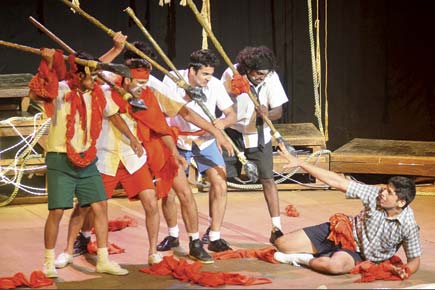It is not exactly news that we are now living in an increasingly violent society

 It is not exactly news that we are now living in an increasingly violent society. Adding to the crime statistics by felons, perfect normal, law-abiding citizens are pushed to reacting with violence to minor provocation, giving rise to cases of road rage, domestic cruelty, atrocities against children. Imagine, a man being killed because his phone’s ringtone offended somebody! And anybody takes umbrage to anything, and the result is aggression.
It is not exactly news that we are now living in an increasingly violent society. Adding to the crime statistics by felons, perfect normal, law-abiding citizens are pushed to reacting with violence to minor provocation, giving rise to cases of road rage, domestic cruelty, atrocities against children. Imagine, a man being killed because his phone’s ringtone offended somebody! And anybody takes umbrage to anything, and the result is aggression.

The play has been considerably simplified to appeal to its young audience and it is bit disconcerting to see them quite unfazed by the goings-on. Pic/Narendra Dangiya
William Golding wrote Lord of the Flies in 1954, which examined the concept of civilisation as we understand it. He wrote the book after his experiences in World War II, and came up with a shocker, mainly because the perpetrators of violence in the book were children — or boys to be specific. A whole generation of children had been exposed to the horrors of war and lost their innocence and faith in humanity. This is what the writer captured in the novel, which remains as vital and relevant over sixty years later, as it was when it was written. The carnage of two World Wars and many others have taught people nothing about the value of peace; every day brings news of savagery from some part of the world or another. We assume children are innocent, but they cannot remain unaffected by what goes on around them.
What if they were to be placed in a situation where survival of the fittest mattered? How would they behave? In R M Ballantyne’s classic The Coral Island, boys marooned on an island discover a kind of nobility within themselves; Golding’s novel, inspired by this one, took the opposite route — dark, pessimistic, brutal.
Young directors Ajitesh Gupta and Neha Gupta have picked up ideas from the Golding masterpiece and created a play for children called Island, which holds up a mirror to the society they now live in — might, they have always been taught, is right — more so when there is no parental or societal control.
Like in Lord of the Flies, the play begins with a plane crash that leaves a group of eight schoolboys stranded on an island. Rishabh (Akshay Anand Kohli) and the pudgy, bespectacled Konark or Kookie (Kaivan Mehta) meet first. Rishabh is a natural leader; Konark is a follower, who has an almost touching faith in the rules and the rituals of a system, where everything can be coped with if everybody respects authority.
Into their small group enters Manjeet (Sagar Gholap), the son of an Army man, who believes he should be the leader. Even in circumstances fraught with danger, the quarrel is over leadership. The other boys — including the son of a politician who is the first one to lose nerve and express fear — are tossed between the two strong-willed boys. Rishabh is the practical one who builds a fire and talks of shelter; Manjeet is the wild one, who fashions weapons out of sticks and leads the boys on a boar hunt. He is the one who comes up with a kind of tribal chant and dance as the boys go hunting, kill and eat the boar, and feel triumphant — even the two Jain boys who have never eaten meat.
Slowly, all pretence at good or considerate behaviour is abandoned — Manjeet’s belligerence overpowers Rishabh’s patience and Kookie’s pathetic attempts at imposing order. “Whoever holds the conch may speak,” he says repeatedly, but his voice is buried under the spiralling anarchy. Manjeet’s insistence on hunting makes them miss a chance of rescue by a passing ship, but this doesn’t bother him or his acolytes. They have degenerated into a primitive stage, painting their faces with clay and creating a god they worship; to their rough hand-painted deity, they make offerings of raw meat. (Red cloth is used to depict meat and blood).
When Manjeet declares that the god now needs human sacrifice, the boys are not shocked or revolted; they have totally lost their moral bearings and all concept of right and wrong that must have been drilled into their heads at school and home. Their enforced freedom has taken away from their minds, the idea of paying for their deeds. In their little island society, with no control or threat of punishment, they are unencumbered by either fear or mercy.
The play has been considerably simplified to appeal to its young audience, and it is bit disconcerting to see them quite unfazed by the goings-on. Perhaps the violence they are exposed to in films, television, video games and comics has desensitised them. When the boys attack one another, kids in the audience laughed. They enjoyed the play, when they should have been troubled by it. Maybe a discussion with children after the play would be in order. They have to be able to express their thoughts on what they see — how we respond to disturbing images is also a test of our cultural impulses. Compassion cannot be allowed to die out.
Deepa Gahlot is an award-winning film and theatre critic and an arts administrator. She tweets at @deepagahlot
 Subscribe today by clicking the link and stay updated with the latest news!" Click here!
Subscribe today by clicking the link and stay updated with the latest news!" Click here!







